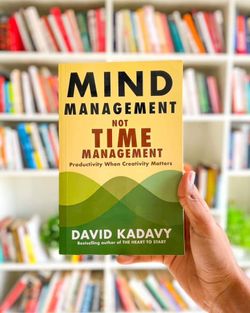Jan 22, 2024
Great Books 98

"Mind Management Not Time Management" by David Kadavy offers valuable lessons on how to optimize our productivity and creativity by focusing on managing our minds rather than just our time.
Here are 10 key lessons from the book:
1. Understand your cognitive rhythms: Recognize that your mind has natural ebbs and flows throughout the day. Identify your most productive and creative periods, and schedule your most important tasks during those times.
2. Prioritize deep work: Deep work refers to focused, uninterrupted work on cognitively demanding tasks. Create an environment that minimizes distractions and dedicates specific blocks of time to deep work. This allows you to accomplish more in less time.
3. Embrace deliberate rest: Rest is not just about taking breaks; it's about intentionally recharging your mind. Engage in activities that promote relaxation and rejuvenation, such as meditation, exercise, or spending time in nature. Deliberate rest enhances your cognitive abilities and overall productivity.
4. Cultivate a growth mindset: Adopt a mindset that believes in the potential for growth and improvement. Embrace challenges, view failures as learning opportunities, and persist in the face of setbacks. This mindset allows you to overcome obstacles and continuously develop your skills.
5. Practice attention management: Instead of trying to multitask, focus on single-tasking and giving your full attention to the task at hand. Minimize distractions, such as notifications or excessive internet browsing, to maintain deep focus and increase productivity.
6. Develop self-awareness: Understand your own strengths, weaknesses, and work preferences. Identify your most productive work environment, whether it's a quiet space or a bustling coffee shop. Tailor your work habits to align with your individual needs for optimal performance.
7. Leverage technology mindfully: While technology can be a powerful tool, it can also be a source of distraction. Use technology intentionally and set boundaries to prevent it from hijacking your attention. Utilize productivity apps and tools that enhance your focus and organization.
8. Foster creativity through curiosity: Cultivate a sense of curiosity and explore diverse interests. Engage in activities outside of your work that spark your imagination and inspire new ideas. This cross-pollination of ideas can lead to innovative thinking and problem-solving.
9. Embrace solitude and reflection: Carve out time for solitude and reflection to process your thoughts and experiences. Disconnect from external stimuli and allow your mind to wander. This practice promotes clarity, self-discovery, and creative insights.
10. Design your environment for success: Create an environment that supports your productivity and mental well-being. Organize your workspace, declutter your digital devices, and surround yourself with inspiration. A well-designed environment can positively impact your focus and motivation.
By implementing these lessons, you can enhance your productivity, tap into your creativity, and manage your mind effectively to achieve your goals.
Book: https://prf.hn/l/YLqXxoR
By undefined
2 notes ・ 2 views
English
Beginner